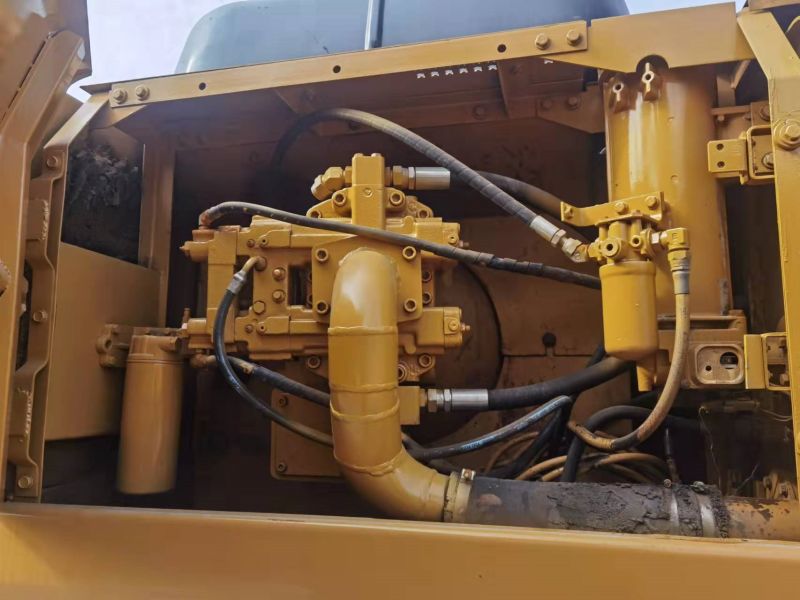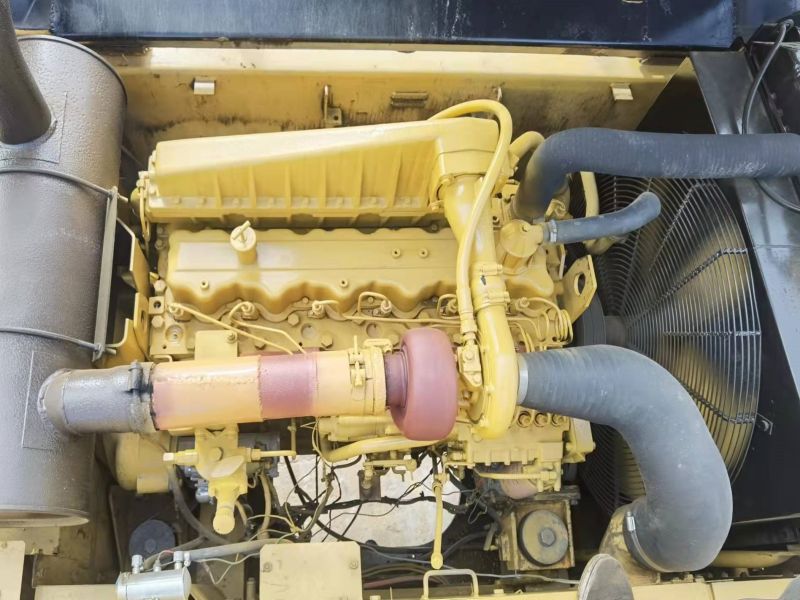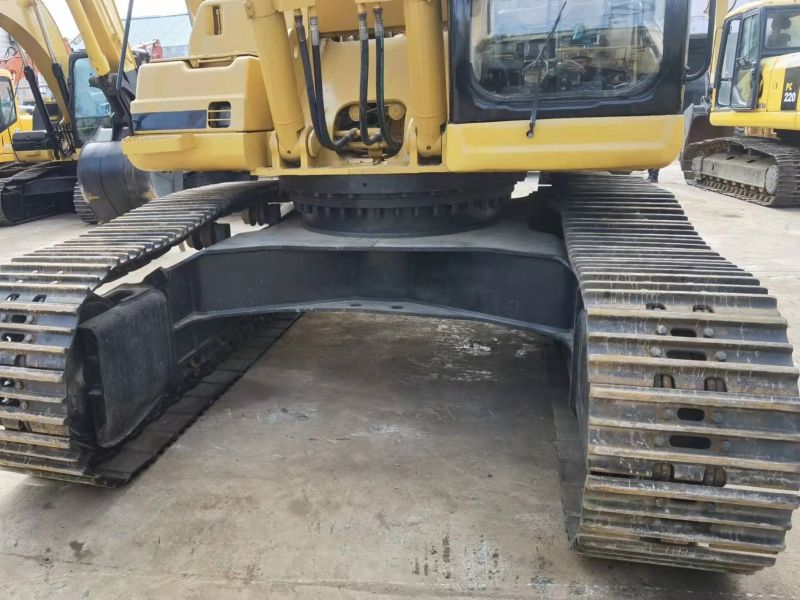Kenya customer buy 3 units of used CAT 330BL excavator
The CAT 330BL is a model of hydraulic excavator produced by Caterpillar Inc., a leading manufacturer of construction and heavy equipment. The 330BL is part of Caterpillar's 300 series of excavators, which are designed for a variety of applications including earthmoving, excavation, trenching, and material handling. Here are some key specifications of the CAT 330BL excavator:
-
Engine: The CAT 330BL is powered by a Caterpillar 3306 diesel engine with a displacement of 10.5 liters. It has a net power output of approximately 222 horsepower (165 kW) at 2,000 RPM.
-
Operating Weight: The operating weight of the CAT 330BL excavator is approximately 34,000 kg (74,957 lbs) for the standard configuration without additional attachments.
-
Bucket Capacity: The standard bucket capacity for the CAT 330BL is 1.6 cubic meters (2.1 cubic yards), although larger buckets may be available as optional attachments.
-
Digging Depth: The maximum digging depth of the CAT 330BL is approximately 7.9 meters (26 feet), which allows for efficient excavation in various types of soil and material.
-
Reach: The maximum horizontal reach of the CAT 330BL is approximately 11.7 meters (38 feet), which allows for efficient loading and unloading of materials and debris.
-
Hydraulic System: The CAT 330BL features a hydraulic system that provides smooth and powerful operation of the boom, stick, and bucket. It has multiple hydraulic pumps and valves to control the various functions of the machine.
-
Cab: The operator's cab of the CAT 330BL is designed for comfort and productivity, with features such as air conditioning, adjustable seating, ergonomic controls, and excellent visibility for increased operator efficiency and safety.
-
Undercarriage: The CAT 330BL has a track-type undercarriage with durable tracks and rollers for smooth and reliable operation on various terrains.
-
Additional Features: The CAT 330BL may come with additional features such as quick couplers for easy attachment changes, auxiliary hydraulic lines for attachments, and advanced monitoring and diagnostic systems for efficient operation and maintenance.
Overall, the CAT 330BL is a versatile and powerful hydraulic excavator suitable for a wide range of construction and excavation applications. It is known for its durability, performance, and reliability, making it a popular choice among construction professionals. However, it's important to note that specifications and features may vary depending on the specific model year, configuration, and optional attachments of the CAT 330BL excavator.





Kenya excavator industry
The excavator industry in Kenya, like in many other countries, plays a crucial role in the construction, infrastructure development, and mining sectors. Excavators are heavy equipment machines used for digging, trenching, earthmoving, and other construction-related tasks. In Kenya, the excavator industry has seen significant growth in recent years, driven by increased construction and infrastructure projects across the country.
Here are some key aspects of the excavator industry in Kenya:
Demand: The demand for excavators in Kenya is driven by various factors, including the growing need for infrastructure development, road construction, building construction, mining activities, and other large-scale projects. Additionally, urbanization and population growth have also led to increased demand for housing and commercial projects, further driving the need for excavators in the country.
Usage: Excavators in Kenya are used in various applications, including road construction, building construction, mining, land clearing, and other infrastructure projects. They are used for tasks such as digging foundations, excavating trenches for utilities, loading and unloading materials, and land leveling, among others.
Brands: Several global brands, including Caterpillar, Komatsu, Hitachi, JCB, and Volvo, among others, have a presence in the Kenyan excavator market. These brands offer a range of excavator models with varying capacities, features, and technologies to cater to the diverse needs of the Kenyan construction and mining sectors.
Local Manufacturing: Kenya also has a growing market for locally assembled or manufactured excavators. Some local companies are involved in the assembly of excavators using imported components, while others manufacture smaller-sized excavators to cater to the specific needs of the local market.
Rental Market: Excavator rentals are also common in Kenya, as many construction and infrastructure projects prefer to rent rather than purchase excavators due to capital cost constraints or project-specific requirements. Rental companies and equipment leasing firms provide a range of excavator models for short-term and long-term rentals, which further supports the excavator industry in Kenya.
Challenges: The excavator industry in Kenya also faces challenges, including high import duties and taxes on heavy equipment, lack of skilled operators and technicians, and inadequate infrastructure for maintenance and repairs. Additionally, there may be issues related to counterfeit or low-quality equipment, lack of access to financing for equipment purchases, and regulatory compliance.
Government Initiatives: The Kenyan government has been taking initiatives to promote the growth of the construction and infrastructure sectors, which indirectly supports the demand for excavators. This includes investments in infrastructure development, road construction projects, and policies aimed at improving the business environment and attracting foreign investment.
In summary, the excavator industry in Kenya is growing, driven by increased demand for construction and infrastructure projects. Global and local brands, as well as rental companies, play a significant role in meeting the demand for excavators in the country. However, challenges such as import duties, lack of skilled operators, and infrastructure limitations may impact the industry's growth. Government initiatives aimed at promoting the construction and infrastructure sectors can also impact the demand for excavators in Kenya.
How to buy a used excavator
Buying a used excavator requires careful consideration and thorough research to ensure that you are getting a reliable machine that meets your requirements. Here are the general steps to follow when buying a used excavator:
-
Define your requirements: Determine your specific needs and requirements for the excavator, such as the size, capacity, and features that are suitable for your intended applications. This will help you narrow down your search and find a used excavator that fits your needs.
-
Research and compare: Research different excavator brands, models, and sellers to get an understanding of the market and compare available options. Consider factors such as condition, age, price, location, and after-sales support.
-
Find a reputable seller: Look for reputable sellers or dealers who have a good reputation and experience in selling used excavators. Authorized dealers or well-known dealerships may offer more reliable options, but independent sellers or online marketplaces can also be considered. Check reviews, ask for references, and verify the seller's credibility before proceeding with a purchase.
-
Inspect the excavator: Thoroughly inspect the condition of the used excavator before making a purchase. Check for any signs of wear and tear, damage, or rust. Inspect the engine, hydraulic system, undercarriage, and attachments (if included) to ensure they are in good working condition. Consider hiring a professional mechanic or technician to conduct a comprehensive inspection to assess the overall condition of the machine.
-
Review documentation: Ensure that the used excavator comes with proper documentation, including a clear title or proof of ownership, service records, and any relevant certifications or permits. Verify the authenticity of the documentation to avoid any legal or financial issues in the future.
-
Test drive (if possible): Whenever possible, test drive the used excavator to assess its performance, functionality, and overall operation. This can help you identify any potential issues or irregularities that may not be apparent during inspection.
-
Negotiate the price: Once you have thoroughly inspected the excavator and reviewed the documentation, negotiate the price with the seller. Consider the condition, age, brand, model, and any included attachments when evaluating the price. It's important to have a budget in mind and be prepared to negotiate based on the condition of the machine.
-
Finalize the purchase: Once you have agreed on the price and other terms with the seller, finalize the purchase by signing a sales agreement or contract. Make sure that all the agreed-upon terms, including the price, condition, and any warranties or guarantees, are clearly stated in the agreement.
-
Arrange transportation: If the used excavator is not located at your desired location, you may need to arrange for transportation. Consider the logistics and costs associated with transporting the excavator to your location, and make necessary arrangements with the seller or a transportation service provider.
-
Follow up with after-sales support: After the purchase, follow up with any after-sales support promised by the seller, such as spare parts, service, or maintenance. Keep all the documentation related to the purchase, including the sales agreement, service records, and warranties, for future reference.
Buying a used excavator requires thorough research, inspection, negotiation, and documentation to ensure a successful purchase. It's important to exercise due diligence, seek professional advice if needed, and carefully evaluate all aspects of the used excavator to make an informed decision.

 CHATING
CHATING CALL
CALL USED
USED CASES
CASES